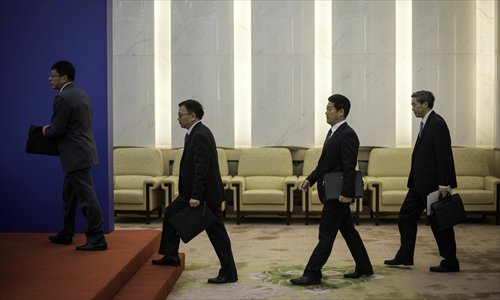China vows open doors for foreign human rights NGOs
Police entrusted with more power to oversee foreign NGOs in new law

Chinese officials arrive for a press conference at the Great Hall of the People in Beijing, on Thursday. China's top legislature passed a law providing new regulations on foreign NGOs. Photo: AFP
China has promised to keep the doors open to human rights NGOs as the country's top legislature passed its very first law to manage the activities of overseas NGOs.
The legislation, coupled with the upcoming enactment of China's first-ever Charity Law, will limit foreign NGOs' influence in certain domestic areas while providing space for domestic NGOs to adapt and survive, analysts said.
China welcomes overseas human rights NGOs, Guo Linmao, a legislative official from the National People's Congress (NPC), told a press conference on Thursday, adding that the country will provide favorable conditions and protect their legal rights but will punish any illegal acts according to the law.
"As long as overseas NGOs abide by China's laws, they can carry out activities without worry," Guo said, in an effort to dispel concerns from foreign organizations.
Although the newly passed law, compared with its second draft, excludes NGOs such as hospitals, schools, research institutes and academic institutions in natural science and engineering from the management scope of police, it will still be applicable to institutions in the social sciences.
"In general, China encourages the development of domestic NGOs and the exchanges between them and their foreign counterparts [through such laws], while it wishes to handle some organizations and activities in a more careful manner," He Lijun, a New York-based professor on public administration at Pace University, told the Global Times on Thursday.
She also noted that international cooperation is necessary for China's domestic NGOs to grow in a globalized context.
The law is expected to come into effect on January 1, 2017.
Over 7,000 overseas NGOs mainly in sectors such as environmental protection, science and technology, education and culture have brought useful expertise and funding to the country, said Fu Ying, spokesperson for this year's NPC annual session.
Official registration
Xu Xianming, deputy head of the NPC Law Committee, was quoted by the Xinhua News Agency as saying on Monday that foundations and social service organizations operated by overseas NGOs, which have already registered with the civil affairs department, will be able to continue operating.
The Ministry of Public Security and provincial police departments will be responsible for the registration and regulation of overseas NGOs, as stipulated in the previous draft of the legislation.
If overseas NGOs plan to operate in China, they shall either directly register with the police or find a Chinese partner to set up cooperation programs that shall be filed with the police, Xinhua reported.
Choosing the police instead of civil affairs departments - which manage domestic NGOs to oversee foreign NGOs - shows that China is still conservative about overseas NGOs, even as the country is becoming increasingly open, He Yong, a representative from the Beijing Office of the International Fund for Animal Welfare, told the Global Times previously.
Chinese authorities are aware and concerned that overseas NGOs can be used by foreign states to promote their objectives and values, or achieve other political agendas.
Guo said Thursday that giving the enforcement power to police would help provide more services for overseas NGOs, as the police are also responsible for entry and exit administration as well as managing foreigners' activities in China.
Money raising restrictions
In response to the restriction that overseas NGOs are not allowed to raise funds in the Chinese mainland, Guo said that overseas NGOs do not qualify because their representative offices in China are not considered legal entities.
China's National People's Congress passed the Charity Law in March to regulate the activities of NGOs, including "banning charity groups and individuals without qualifications from raising money publicly."
Despite some of its more controversial articles, analysts said the new Charity Law actually allows for greater accountability for domestic NGO activities.
"The Charity Law has expanded the room for various social organizations to develop as it to some extent reduced their barriers to raise funds," He Lijun said.
At least China has recognized the variety and significance of NGOs and has gradually pushed forward their development through legislative efforts, she noted.